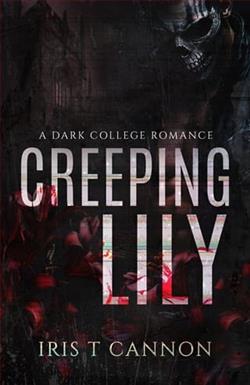Page 51 of The Heartbreak Hotel
“Are you stalling because you know it’s my turn?” He looks at me over the curve of his arm, stretched along the back of the couch. I imagine the night coursing ahead of us—the momentum of it, how inevitable Henry seems, the way I feel the hitch of his lips like an ab cramp. Wringing me out.
“Yes,” I say on a smile, and he breathes a laugh.
“I’ll be nice.”
I answered his question about Colorado as carefully as I could: I stayed for Nate, in some ways. For grad school. For a life I’d built away from a complicated relationship with my family. And for this house—for the home it had become to me. Henry fell quiet at that. And at my question,What are you thinkingright now?he’d said simply,That I’m glad it was you who moved in.
I wanted to ask him why. I wanted to hear him say it. But then Quinn was up from his nap, and now it’s Henry’s turn.
“What did your sister mean?” he asks as I sit down beside him. I leave a foot of space between us on the couch, the size of Quinn’s body. This was easier when he was here between us, setting the guardrail. “In the kitchen, about postponing your career?”
I level Henry with my gaze. He says, “What?”
“You said you were going to benice.”
“You can forfeit.” His fingertips on the couch are centimeters away from my shoulder. “End the game.”
But there’s more I want to know—all of it, everything about him—and when I bring my eyes back to Henry’s, I know that he can tell. That there’s hunger in both of us.
“I’m no quitter,” I say, and when he laughs the movement of it brings his fingers to the back of my neck. My skin blooms with goose bumps, sending a chill through my spine that goes hot as it reaches my core. “Though that’s exactly what Goldie thinks I am, and why she said what she said today.”
He’s quiet, waiting for me to explain. His fingertips move so gently above the collar of my shirt that I could be imagining it. I can’t tell him about the test—can’t tell him about my failure, or the half-truths I’ve told to make the Comeback Inn what it is. But I don’t lie. I say, “She wanted me to start working as a therapist the moment I graduated, and because I didn’t, I’m a failure in her book. Goldie had a plan for me, and this wasn’t it.”
“But you’re doing that work here,” he says. I wish it were true: that I was licensed, that I could legitimize the inn the way he thinks I can. “That’s not good enough for her?”
“Uh-uh,” I say, holding up my hand. “My turn to ask a question.”
Henry lets out a frustrated breath through his nose. “Fine.”
“At Polliwog’s that day,” I say, riding a wild surge of courage. “When I—got lost.”
Henry holds my eyes, steady and careful, like he knows what’s coming.
“You said you understood.” Henry’s fingers on my neck go still, but don’t move away. I focus on the warmth, the solid pressure of his skin on mine. “How?”
Henry licks his lower lip. Pulls it into his mouth. When he presses his lips together and looks across the room, I think I’ve done it: forced his forfeit, pushed us to the end of the line. But then Henry puts his wineglass on the coffee table and turns back to look at me, his eyes dark, and says, “Can I show you something?”
Twenty-One
I feel like I’ve spentweeks watching Henry move through this house: guarded, careful, each footstep chosen with weighted consideration. I’ve watched him check things with me—a flick of his eyes over mine before he opens a cabinet or steps through a door—asking permission. I’ve watched him hesitate to take up space here. Watched him so thoughtfully make sure this house feels like mine.
But when Henry leads me up the stairs, he does it like a man in his own home. Someone who knows where to walk so the fourth step doesn’t creak, who navigates the narrow landing without flicking on the hallway light.
“Is anyone staying in that bedroom?” He points down the hall to the Lupine Room. It’s the smallest of the guest rooms, and the only one facing the street. When I shake my head, Henry leads me toward it.
He twists the doorknob on a steadying breath. Like he’s bracing, though this is Henry—who I’ve only ever seen solid andsure. When I place a hand on his back, warm ridge of muscle under soft flannel, he jumps.
“Sorry,” I whisper, dropping my hand. “Sorry, I didn’t—”
His eyes track over mine, back and forth. In the dark of the Lupine Room, we could be anywhere: a movie theater, the middle of the woods, outer space.
I say, “Are you okay?” and Henry only swallows. He reaches to twist on the bedside lamp, which casts the room in a low, warm glow. There’s a twin-size bed against the wall, white iron frame and sage-green duvet dotted in embroidered daisies. Three scatter rugs layered in the middle of the room. A small desk below the front window, stack of books in its corner.
And Henry, who’s taking it in like a painting. Like the longer he looks, the more there is to see. When he pushes the bedroom door softly closed behind us, heat rises to my neck.
“It’s here,” Henry says, lowering to a squat on the floor. I don’t know whatitis; ifhereis the bedroom or the house or the insulated cocoon that seems to be unfurling around us, warm and soft and dark. “Just—” He breaks off when I crouch beside him on the hardwood. With one look at me, he reaches for the baseboard next to the door and gently pries at the edge of the wallpaper. It was here when Nate and I moved in: cream with a pale green pine needle motif, so delicate that if you let your eyes unfocus it loses all its shape. I watch Henry peel it back, gently, one centimeter at a time. “Sorry,” he says, though I’m unsure whether he’s apologizing to me or the house. “There.”
He drops his hands to his legs, fingers hanging into the space between his thighs. I look at the wall, at his guarded face, back at the wall. He’s exposed a sticky-note-sized window into theworld beneath the pine wallpaper. In the dim light, it takes me a moment to clock the pattern for what it is: a child’s sky, perfect blue, dotted with fluffy clouds and a plump bird and the colorful edge of a hot-air balloon.















